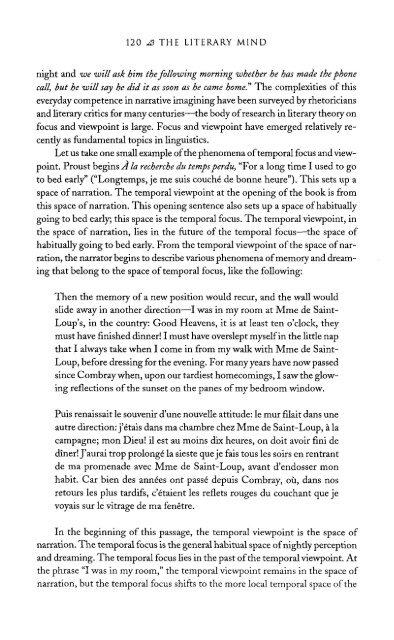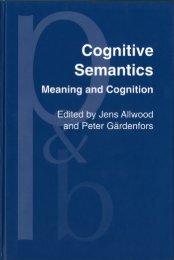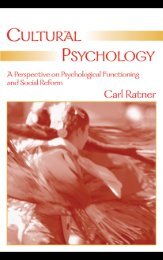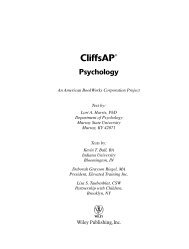The Literary Mind.pdf
The Literary Mind.pdf
The Literary Mind.pdf
You also want an ePaper? Increase the reach of your titles
YUMPU automatically turns print PDFs into web optimized ePapers that Google loves.
120 THE LITERARY MIND<br />
night and we will ask him the following morning whether he has made the phone<br />
call, but he will say he did it as soon as he came home." <strong>The</strong> complexities of this<br />
everyday competence in narrative imagining have been surveyed by rhetoricians<br />
and literary critics for many centuries—the body of research in literary theory on<br />
focus and viewpoint is large. Focus and viewpoint have emerged relatively recently<br />
as fundamental topics in linguistics.<br />
Let us take one small example of the phenomena of temporal focus and viewpoint.<br />
Proust begins A la recherche du temps perdu, "For a long time I used to go<br />
to bed early" ("Longtemps, je me suis couche de bonne heure"). This sets up a<br />
space of narration. <strong>The</strong> temporal viewpoint at the opening of the book is from<br />
this space of narration. This opening sentence also sets up a space of habitually<br />
going to bed early; this space is the temporal focus. <strong>The</strong> temporal viewpoint, in<br />
the space of narration, lies in the future of the temporal focus—the space of<br />
habitually going to bed early. From the temporal viewpoint of the space of narration,<br />
the narrator begins to describe various phenomena of memory and dreaming<br />
that belong to the space of temporal focus, like the following:<br />
<strong>The</strong>n the memory of a new position would recur, and the wall would<br />
slide away in another direction—I was in my room at Mme de Saint-<br />
Loup's, in the country: Good Heavens, it is at least ten o'clock, they<br />
must have finished dinner! I must have overslept myself in the little nap<br />
that I always take when I come in from my walk with Mme de Saint-<br />
Loup, before dressing for the evening. For many years have now passed<br />
since Combray when, upon our tardiest homecomings, I saw the glowing<br />
reflections of the sunset on the panes of my bedroom window.<br />
Puis renaissait le souvenir d'une nouvelle attitude: le mur filait dans une<br />
autre direction: j'etais dans ma chambre chez Mme de Saint-Loup, a la<br />
campagne; mon Dieu! il est au moins dix heures, on doit avoir fini de<br />
diner! J'aurai trop prolonge la sieste que je fais tous les soirs en rentrant<br />
de ma promenade avec Mme de Saint-Loup, avant d'endosser mon<br />
habit. Car bien des annees ont passe depuis Combray, ou, dans nos<br />
retours les plus tardifs, c'etaient les reflets rouges du couchant que je<br />
voyais sur le vitrage de ma fenetre.<br />
In the beginning of this passage, the temporal viewpoint is the space of<br />
narration. <strong>The</strong> temporal focus is the general habitual space of nightly perception<br />
and dreaming. <strong>The</strong> temporal focus lies in the past of the temporal viewpoint. At<br />
the phrase "I was in my room," the temporal viewpoint remains in the space of<br />
narration, but the temporal focus shifts to the more local temporal space of the















